
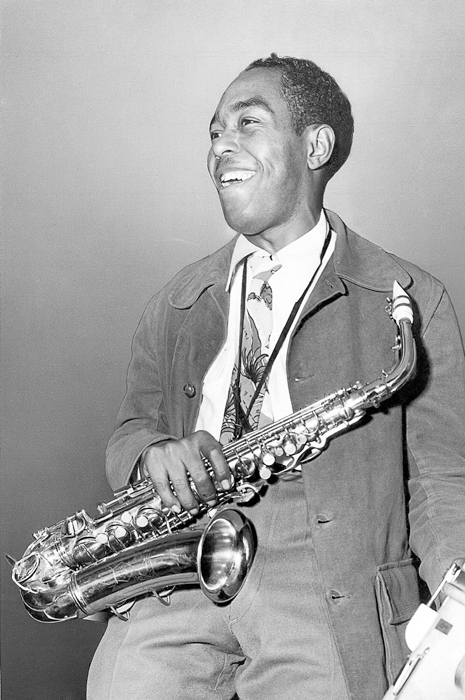
MUSIC IN AMERICAN LIFE
A list of books in the series appears at the end of this book.

2013 by Charles Haddix
All rights reserved
Manufactured in the United States of America
c 5 4 3 2 1
 This book is printed on acid-free paper.
This book is printed on acid-free paper.
Frontispiece: Charlie at Billy Bergs, 1946.
(Used by permission of the University
of MissouriKansas City Libraries,
Dr. Kenneth J. LaBudde Department
of Special Collections.)
Library of Congress Cataloging-in-Publication Data
Haddix, Chuck.
Bird : the life and music of Charlie Parker /
Chuck Haddix.
Pages cm. (Music in American life)
Includes bibliographical references and index.
ISBN 978-0-252-03791-7 (hardcover : alk. paper)
ISBN 978-0-252-09517-7 (e-book)
1.Parker, Charlie, 19201955.
2.Jazz musiciansUnited StatesBiography.
I. Title.
ML419.P4H34 2013
788.7'3165092dc23 2013003509
[B]
For Bill Tuttle, a scholar, bon vivant,
and always an inspiration.
Come, fill the Cup, and in the fire of Spring,
Your Winter garment of Repentance fling;
The Bird of time has but a little way
To flutterand the Bird is on the Wing.
Rubaiyat of Omar Khayyam
Contents
Acknowledgments
I would like to thank a number of individuals and institutions: above all, Richard Wentworth, Willis G. Reiger, and the staff at the University of Illinois Press for their outstanding stewardship of this biography.
Kudos to Teddy Dibble for introducing me to Birds music, for his friendship and his help with this manuscript. Thanks to Norman Saks and Carl Woideck, who gave so much to this biography. Arigato to Yoko Takemura for her enthusiastic support of this project and Kansas City jazz. A special thanks to Kelley Martin, Stuart Hinds, Kelly McEniry, Bonnie Postlewaite, and the rest of the staff in the Miller Nichols Library at the University of MissouriKansas City for their friendship and their support of this project.
Thanks to Donna Ranieri for providing images from the Frank Driggs collection. Thanks also to Bruce Bettinger and John Hans for their help with the photos in this book. A special thanks to Frederick R. Swischer for his help with the musical analysis. I am grateful to Victoria Menninger for her help with the final edit of the manuscript.
As always, thanks and much love to my ever-lovin wife, Terri Mac, and our children: Sam, Mimi, Will, Phoebe, and Bex.
Introduction
A clap of thunder heralded the passing of Charlie Bird Parker. Baroness Pannonica de Koenigswarter, who gave Charlie refuge and comfort during his final days in her suite at the Hotel Stanhope on Fifth Avenue, recalled, At the moment of his going, there was a tremendous clap of thunder. I didnt think about it at the time, but Ive thought about it often since; how strange it was. One musician speculated that Charlie disintegrated into pure sound.
Charlie Parker had lived life to its fullest. Robert Reisner, a friend of Charlies and author of Bird: The Legend of Charlie Parker, observed, Charlie Parker, in the brief span of his life, crowded more living into it than any other human being. He was a man of tremendous physical appetites. He ate like a horse, drank like a fish, was as sexy as a rabbit. He was complete in the world, was interested in everything. He composed, painted; he loved machines, cars; he was a loving father. He liked to joke and laugh. He never slept, subsisting on little catnaps. Everyone was his frienddelivery boys, taxicab drivers.... No one had such a love of life, and no one tried harder to kill himself. Dr. Richard Freymann, the attendant physician during Charlies final days at the Stanhope Hotel, judged him to be fifty-three years old. He was thirty-four at the time of his death.
Charlies early death came as no surprise to those who knew him well. After becoming hooked on heroin at age sixteen, Charlie struggled with drug addiction and alcohol abuse for the rest of his life. Over the years, his massive consumption of alcohol and drugs ravaged his already fragile physical and mental health. Bandleader Jay McShann observed, I knew it was going to happen sooner or later. The way he was goin with that dope and all. He could only last so long.
Nevertheless, during his short life, Charlie changed the course of music. Like Louis Armstrong, Duke Ellington, Miles Davis, and John Coltrane, he was a transitional composer and improviser who ushered in a new era of jazz and influenced subsequent generations of musicians.
Originally from Kansas City, Charlie moved to New York where he pioneered bebopa revolution in jazz. Bursting with fresh ideas and virtuosity, his solos and compositions have inspired musicians and composers across a broad spectrum of music, ranging from Moondog, a contemporary composer and street musician, to the rock group the Red Hot Chili Peppers. Jazz historian Martin Williams judged that Charlie influenced everyone. In 1965, jazz pianist Lennie Tristano observed, If Charlie Parker wanted to invoke plagiarism laws, he could sue almost everybody whos made a record in the last ten years.
Charlies brilliance and charisma also inspired dancers, poets, writers, filmmakers, and visual artists. Jack Kerouac emulated Charlies improvisational style in his poem Mexico City Blues, writing, I want to be considered a jazz poet blowing a long blues in an afternoon jazz jam session on Sunday. I take 242 choruses; my ideas vary and sometimes roll from chorus to chorus or from halfway through a chorus to halfway into the next. Kerouacs novel The Subterraneans features a cameo appearance by Charlie. Waring Cuney, Robert Pinsky, Robert Creely, and numerous other poets have also sung Charlies praises in verse. Clint Eastwood paid homage to Charlies tortured genius with his film Bird. In 1984, the Alvin Ailey Dance Company celebrated Charlie with For Bird With Love. Artist Jean-Michel Basquiat honored Charlie with many artworks, including Charles the First.
Surprisingly, considering Charlies broad influence on music and arts, details of his personal life have remained largely enigmatic. Because of his erratic lifestyle and addictions, few documents or artifacts from his life survived. His saxophones usually ended up in pawnshops, and the music he hastily scribbled on the back of envelopes on the way to recording sessions disappeared afterward. He rarely committed his thoughts to paper and was not forthcoming about his personal life during interviews.
His chameleon-like ability to empathize with those he met socially and professionally left vivid but vastly differing impressions. Frances Davis in Bebop and Nothingness explained that among fellow musicians, Charlie was in the eye of the beholder: what he was like as a person depends on whom you ask. This is evident in the remembrances of Charlie published in Robert Reisners book Bird: The Legend of Charlie Parker. It is almost as if those interviewed recall eighty-two different Charlie Parkers.
These differing accounts are understandable, considering Charlies numerous self-contradictions. He was alternately generous to a fault and then miserly. A loving husband and father at home, he was an obsessive philanderer while on the road. An addict, he lectured younger musicians about the dangers of drugs, advising them to do as I say, not as I do. He rarely showed up on time for engagements, if at all, but once on stage he took charge. A high school dropout, he was well read and well spoken. The ultimate hipster, he used his considerable charm to con friends and strangers alike. He was known for his many acts of kindness and cruelty. A musical genius who struggled with mental health problems, he yearned for normalcy. A man of few words, he let his horn do the talking.
Next page
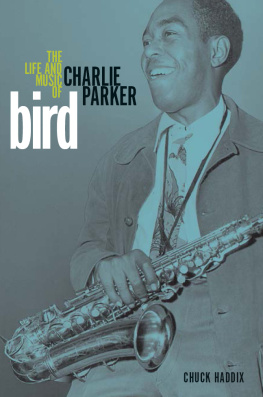

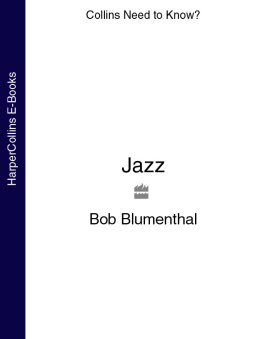
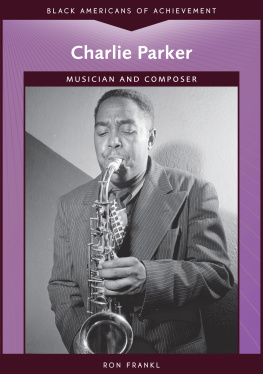
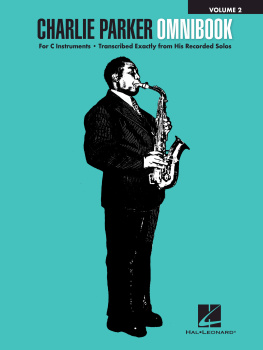
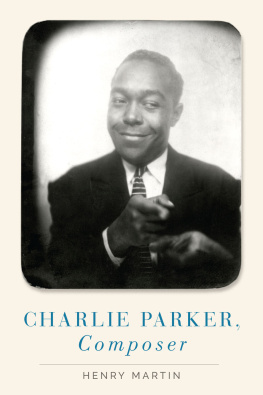
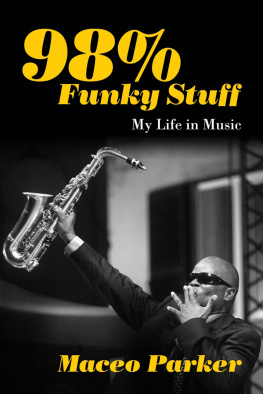
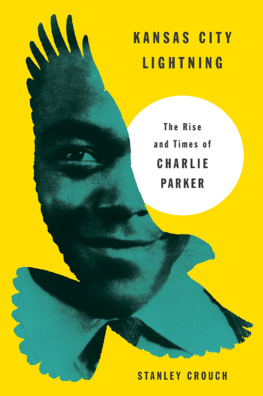
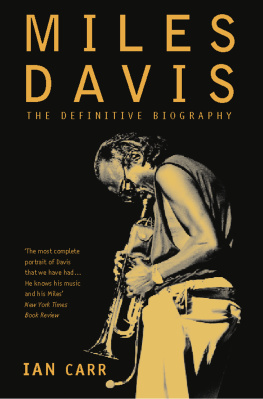
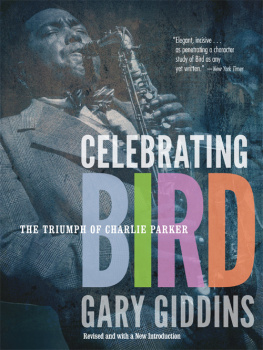
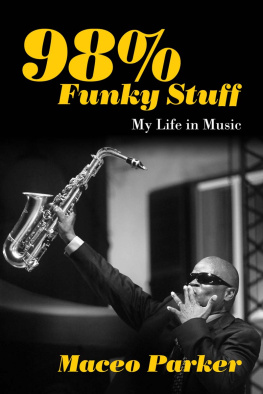
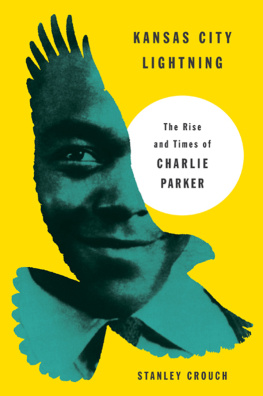



 This book is printed on acid-free paper.
This book is printed on acid-free paper.